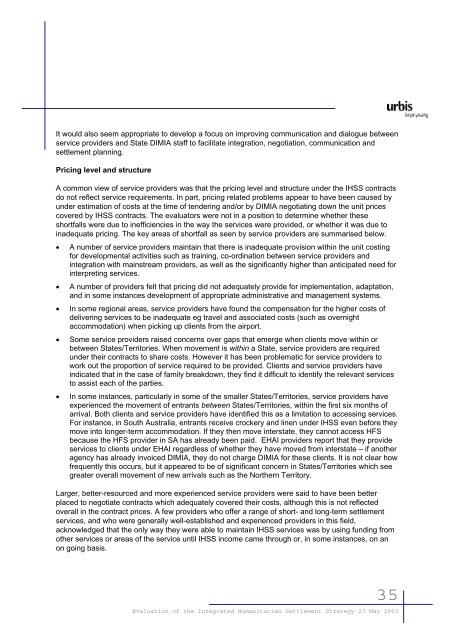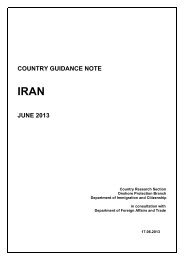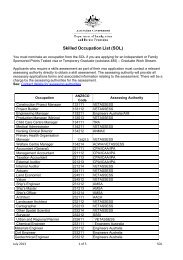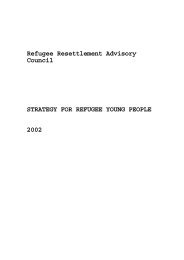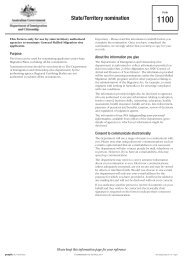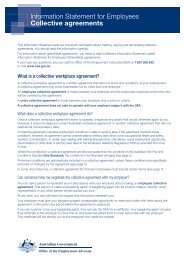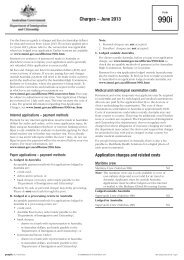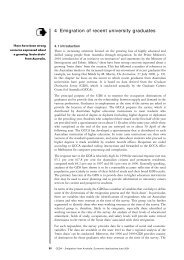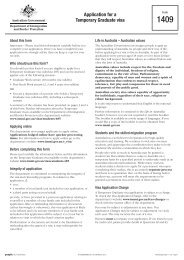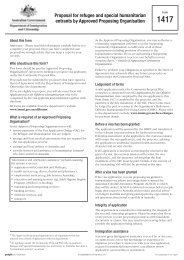Evaluation of the Integrated Humanitarian Settlement Strategy (IHSS)
Evaluation of the Integrated Humanitarian Settlement Strategy (IHSS)
Evaluation of the Integrated Humanitarian Settlement Strategy (IHSS)
Create successful ePaper yourself
Turn your PDF publications into a flip-book with our unique Google optimized e-Paper software.
It would also seem appropriate to develop a focus on improving communication and dialogue between<br />
service providers and State DIMIA staff to facilitate integration, negotiation, communication and<br />
settlement planning.<br />
Pricing level and structure<br />
A common view <strong>of</strong> service providers was that <strong>the</strong> pricing level and structure under <strong>the</strong> <strong>IHSS</strong> contracts<br />
do not reflect service requirements. In part, pricing related problems appear to have been caused by<br />
under estimation <strong>of</strong> costs at <strong>the</strong> time <strong>of</strong> tendering and/or by DIMIA negotiating down <strong>the</strong> unit prices<br />
covered by <strong>IHSS</strong> contracts. The evaluators were not in a position to determine whe<strong>the</strong>r <strong>the</strong>se<br />
shortfalls were due to inefficiencies in <strong>the</strong> way <strong>the</strong> services were provided, or whe<strong>the</strong>r it was due to<br />
inadequate pricing. The key areas <strong>of</strong> shortfall as seen by service providers are summarised below.<br />
<br />
<br />
<br />
<br />
<br />
A number <strong>of</strong> service providers maintain that <strong>the</strong>re is inadequate provision within <strong>the</strong> unit costing<br />
for developmental activities such as training, co-ordination between service providers and<br />
integration with mainstream providers, as well as <strong>the</strong> significantly higher than anticipated need for<br />
interpreting services.<br />
A number <strong>of</strong> providers felt that pricing did not adequately provide for implementation, adaptation,<br />
and in some instances development <strong>of</strong> appropriate administrative and management systems.<br />
In some regional areas, service providers have found <strong>the</strong> compensation for <strong>the</strong> higher costs <strong>of</strong><br />
delivering services to be inadequate eg travel and associated costs (such as overnight<br />
accommodation) when picking up clients from <strong>the</strong> airport.<br />
Some service providers raised concerns over gaps that emerge when clients move within or<br />
between States/Territories. When movement is within a State, service providers are required<br />
under <strong>the</strong>ir contracts to share costs. However it has been problematic for service providers to<br />
work out <strong>the</strong> proportion <strong>of</strong> service required to be provided. Clients and service providers have<br />
indicated that in <strong>the</strong> case <strong>of</strong> family breakdown, <strong>the</strong>y find it difficult to identify <strong>the</strong> relevant services<br />
to assist each <strong>of</strong> <strong>the</strong> parties.<br />
In some instances, particularly in some <strong>of</strong> <strong>the</strong> smaller States/Territories, service providers have<br />
experienced <strong>the</strong> movement <strong>of</strong> entrants between States/Territories, within <strong>the</strong> first six months <strong>of</strong><br />
arrival. Both clients and service providers have identified this as a limitation to accessing services.<br />
For instance, in South Australia, entrants receive crockery and linen under <strong>IHSS</strong> even before <strong>the</strong>y<br />
move into longer-term accommodation. If <strong>the</strong>y <strong>the</strong>n move interstate, <strong>the</strong>y cannot access HFS<br />
because <strong>the</strong> HFS provider in SA has already been paid. EHAI providers report that <strong>the</strong>y provide<br />
services to clients under EHAI regardless <strong>of</strong> whe<strong>the</strong>r <strong>the</strong>y have moved from interstate – if ano<strong>the</strong>r<br />
agency has already invoiced DIMIA, <strong>the</strong>y do not charge DIMIA for <strong>the</strong>se clients. It is not clear how<br />
frequently this occurs, but it appeared to be <strong>of</strong> significant concern in States/Territories which see<br />
greater overall movement <strong>of</strong> new arrivals such as <strong>the</strong> Nor<strong>the</strong>rn Territory.<br />
Larger, better-resourced and more experienced service providers were said to have been better<br />
placed to negotiate contracts which adequately covered <strong>the</strong>ir costs, although this is not reflected<br />
overall in <strong>the</strong> contract prices. A few providers who <strong>of</strong>fer a range <strong>of</strong> short- and long-term settlement<br />
services, and who were generally well-established and experienced providers in this field,<br />
acknowledged that <strong>the</strong> only way <strong>the</strong>y were able to maintain <strong>IHSS</strong> services was by using funding from<br />
o<strong>the</strong>r services or areas <strong>of</strong> <strong>the</strong> service until <strong>IHSS</strong> income came through or, in some instances, on an<br />
on going basis.<br />
35<br />
<strong>Evaluation</strong> <strong>of</strong> <strong>the</strong> <strong>Integrated</strong> <strong>Humanitarian</strong> <strong>Settlement</strong> <strong>Strategy</strong> 27 May 2003


